Trump sends New Year greetings as US-Iran tensions persist
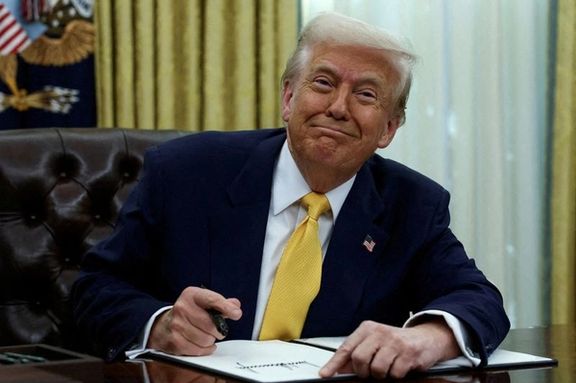
US President Donald Trump extended Nowruz greetings to those celebrating the Persian New Year, while tensions between the two nations over Iran's nuclear program escalate.

US President Donald Trump extended Nowruz greetings to those celebrating the Persian New Year, while tensions between the two nations over Iran's nuclear program escalate.
“Nowruz is a joyous occasion for the Persian people, marking the beginning of spring, and the Persian New Year. This long-standing tradition presents a time to reflect on the blessings of the previous year and prepare for the coming spring with a renewed spirit of optimism,” he said in a message published by the White House on Wednesday.
The US has one of the largest expatriate population of Iranians abroad with numbers estimated to be around 620,000 in California alone, according to the Harris Poll and UCLA research.
Research from the United Nations Population Division in 2019 found that the US is the most popular destination for Iranians living abroad.
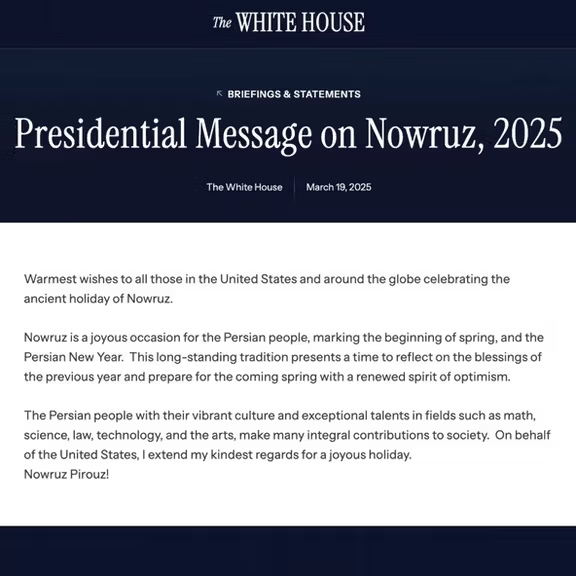
In his message, he highlighted the contributions of Iranians to various fields, saying, “The Persian people with their vibrant culture and exceptional talents in fields such as math, science, law, technology, and the arts, make many integral contributions to society.”
Trump’s statement comes amid a renewed policy of maximum pressure on Iran, including tough economic sanctions and diplomatic isolation.
A letter he sent to Iran’s Supreme Leader, Ali Khamenei, seemingly set conditions for de-escalation, calling for Tehran to dismantle its nuclear program, impose strict limits on missile development, and halt support for regional armed groups.
While Trump has voiced a preference for diplomatic means with Iran, he has not ruled out military options, while Khamenei has banned talks with the US under the current conditions.

French citizen Olivier Grondeau was released from 887 days in detention in Iran, French President Emmanuel Macron announced on Thursday in a post on X.
“Our mobilization will not weaken: Cécile Kohler and Jacques Paris must be freed from Iranian jails,” Macron said, referring to other citizens still left behind.
Cécile Kohler and Jacques Paris were arrested in May 2022 while traveling in Iran as tourists, accused of espionage.
Grondeau’s release comes after months of pressure from Paris, which had been demanding the release of its citizens.
In January, Grondeau publicly revealed his identity for the first time in a recorded phone call from prison, aired by France Inter. He described his detention as arbitrary and unbearable.
The 34-year-old tourist, who was arrested on October 12, 2022, in Shiraz during a world tour, said he was a victim of political blackmail as France and Iran negotiated his case.
He was later sentenced to five years in prison for “espionage and conspiracy against the Islamic Republic” and was held in Evin Prison, in a section designated for foreign and dual-national detainees. Exact numbers of such prisoners rights groups brand 'diplomatic hostages', remain undisclosed.
During his phone call, Grondeau pleaded with French authorities to secure his release and expressed hope that his request for parole would be granted.
The French Foreign Ministry, which had already summoned Iran’s ambassador on January 10, denounced the detention conditions of Grondeau, Kohler, and Paris.
“Their situation is intolerable, with inhumane detention conditions that, in some cases, constitute torture under international law,” the ministry stated.
Grondeau shared a cell with 18 other detainees and had limited access to a library and books sent by the French embassy. He also highlighted the harsher conditions faced by Kohler and Paris in his message.
“You, who have the power to influence this matter, hear this truth,” Grondeau said, addressing French authorities.
“Cécile’s strength, Jacques’ strength, Olivier’s strength—it is all running out.”
“Your responsibility is called upon to ensure the survival of three human beings.”
The IRGC has arrested dozens of dual nationals and foreign citizens in recent years, mostly on espionage and security charges.
Most recently, an Italian journalist was released following an arrest that was widely seen as leverage to pressure Italy into freeing an Iranian imprisoned on terrorism charges.
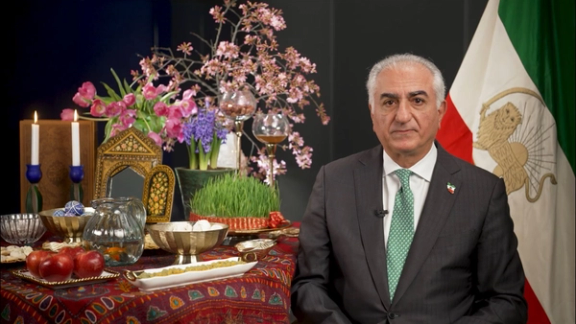
Iran's exiled prince Reza Pahlavi urged all Iranians on the eve of their New Year to join forces to topple a ruling system that he said is on the verge of collapse.
“We enter the New Year at a time when the Islamic Republic is at its weakest and most ineffective," Pahlavi said in a video address to Iranians posted on X on Wednesday.
"A unique window of opportunity has emerged for major change and the liberation of Iran from religious tyranny," he added, citing the blows to Tehran's regional influence during the conflict with Israel in the year past.
"The coming year is the year of organizing for the final move."
The New Year in Iranian calendar begins on March 20th, when state media broadcast official address by Iran's president and supreme leader---who sets the agenda for the year ahead, usually with a phrase summing it up.
Pahlavi's message on the eve of the New Year is aimed to cement his position as a prominent opposition figure whose supporters see as Iran's best hope to undo the revolution that ousted his father Mohammad Reza in 1979.
"In the past year, at your call, I accepted the responsibility of leading the national revolution and the transition period," Pahlavi said in his address, calling for dissidents to put aside their differences.
Those supporting the exiled prince consider him to be peerless and above political groupings and coalitions. His critics among the opposition question this assertion and accuse Pahlavi's supporters of stifling debate by attacking those dissidents who do not follow him or criticize his father, the last Shah of Iran.
Pahlavi appeared to address this rift in his message.
"At the start of this new year, I urge all of you, my dear compatriots, to use this occasion to be kinder to one another and to stand more united against our common enemy—the Islamic Republic," he said.
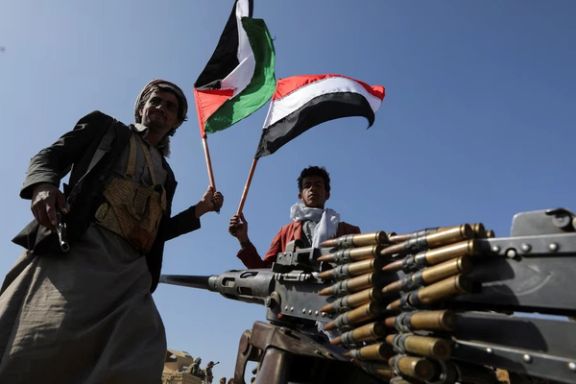
US president Donald Trump says it's not enough for Iran to reduce its support of Houthis and all arms provisions must end, citing reports that Tehran has rolled back its supplies to the Yemen group.
"Reports are coming in that while Iran has lessened its intensity on Military Equipment and General Support to the Houthis, they are still sending large levels of Supplies," Trump posted on TruthSocial on Wednesday. "Iran must stop the sending of these Supplies IMMEDIATELY."
The social media announcement comes a few days after another post in which he said Tehran will be held responsible for Houthi attacks and threatened the theocracy with "dire" consequences.
"Let the Houthis fight it out themselves," Trump's Wednesday message reads. "Either way they lose, but this way they lose quickly ... It’s not even a fair fight, and never will be. They will be completely annihilated!"
Trump on Saturday ordered large-scale military strikes against dozens of targets in Yemen controlled by Tehran-backed Houthi armed group, saying the attacks aimed at ensuring freedom of navigation through shipping lanes the militants have targeted.
Fresh US air strikes hit Yemen on Monday, the Houthis' Al Masirah TV reported. The Houthi-run health ministry said on Sunday that at least 53 people were killed in the attacks.
At a Pentagon press conference on Monday, lieutenant general Alexus Grynkewich told reporters that military casualties among the Houthis were in the dozens but there were no indications of civilian casualties.
Shortly after Israel's incursion into Gaza triggered by a Hamas attack on Oct. 7, 2023, the Shi'ite militant group which seized control of much of Yemen started missile and drone strikes against commercial and military vessels in the Red and Arabian Seas.
They described the effort as a blockade in solidarity with the Palestinian people.
Iran and the Houthis have denied close military coordination but weapons experts have linked the Yemeni fighters' advanced arsenal of anti-ship and ballistic missiles to Iranian technology.
US forces have been locked in their most intense naval combat since World War II with the Houthis but have yet to constrain the maritime attacks.
As ceasefires have taken hold pausing combat between Israel and its badly bludgeoned Hamas and Hezbollah militant adversaries, the Houthis have become the vanguard of Tehran's network of armed affiliates in the Middle East.
The Trump administration views their continued harassment of commercial shipping as an obstacle to his fight to bring down prices for US consumers and continued but largely ineffectual targeting of US forces as a nuisance.
"Iran has played “the innocent victim” of rogue terrorists from which they’ve lost control, but they haven’t lost control," Trump said.
Trump this month demanded Iran agree new deal over its nuclear program or face military attack - an overture rejected by Iran's Supreme Leader as bullying.
Ali Khamenei warned Washington would come off worst in any confrontation, insisting that Iran had not been weakened by over a year of direct and proxy conflict with Israel.
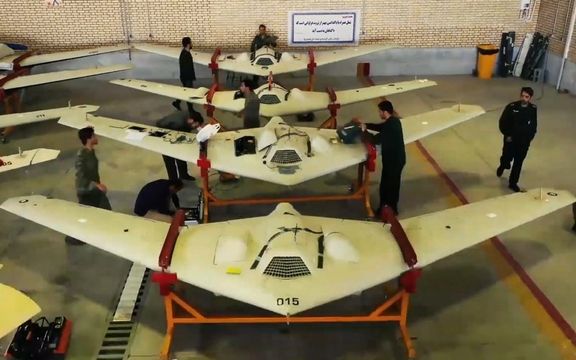
The US State Department’s Rewards for Justice program is offering up to $15 million for information on four Chinese individuals involved in supplying Iran’s Islamic Revolutionary Guard Corps (IRGC) with US-controlled technology.
The IRGC, including its Qods Force, is designated by the US as a Foreign Terrorist Organization and has been linked to armed groups such as Hamas, Hezbollah, and Iran-backed militias in Iraq.
The US government has accused the Chinese nationals—Liu Baoxia, Li Yongxin, Yung Yiu Wa, and Zhong Yanlai—of using front companies to illegally procure and transfer US electronic components to Iran.
“Beginning as early as May 2007, Liu and her associates allegedly utilized an array of front companies in the People’s Republic of China (PRC) to send dual-use US-origin electronic components to IRGC-linked companies that could be used in the production of UAVs, ballistic missile systems, and other military end uses,” the State Department said in its announcement.
The Justice Department charged them in January 2024 with conspiring to smuggle thousands of restricted components for use in Iranian drones and missile systems.
Last week, Rewards for Justice offered a reward of up to $15 million for information that could disrupt financial networks supporting a drone-production arm of Iran’s Islamic Revolutionary Guard Corps' elite Qods Force called Kimia Part Sivan Company (KIPAS).
The company has also sourced key drone components from foreign suppliers, according to US officials.
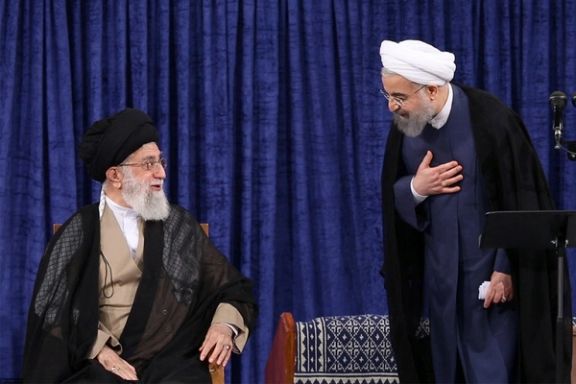
Former President Hassan Rouhani has acknowledged that his administration came close to reviving the 2015 nuclear deal under Biden, but Tehran’s internal divisions prevented the agreement.
"Biden’s election was a golden opportunity for the Islamic Republic," Rouhani said Tuesday in an interview with Iran newspaper. "We could have restored the nuclear deal in 2021, but due to political disputes over who would take the presidency next, that opportunity was lost. Now, our situation is harder than ever."
According to Rouhani, who served from 2013 to 2021, his top negotiator at the time, Abbas Araghchi—now Iran’s foreign minister—had reached a framework agreement for reviving the deal with Robert Malley, President Joe Biden’s special envoy for Iran.
Malley, who led US efforts to restart nuclear negotiations, was placed on unpaid leave in April 2023 amid an FBI investigation into his handling of classified information. A Wall Street Journal report in September said that Malley had clicked on a phishing link that compromised his personal email and may have moved classified meeting notes to an unauthorized account.
During Malley’s tenure, the Biden administration informally eased enforcement of US oil sanctions on Iran which were imposed by President Donald Trump in 2018. Iranian oil exports, which had dropped to 250,000 barrels per day in 2019 under Trump’s maximum-pressure campaign, surged to nearly 2 million barrels per day during Biden’s presidency.
Rouhani also said that Malley and Araghchi’s agreement would have ensured not only a US return to the nuclear deal but also the reversal of Trump-era policies, including sanctions on Iran’s Supreme Leader’s office and the designation of the Islamic Revolutionary Guard Corps (IRGC) as a terrorist organization.
Rouhani, who according to Iranian laws could run for a third term, was succeeded by hardliner cleric Ebrahim Raisi in June 2021. His administration resumed talks with JCPOA signatories, but negotiations collapsed after Russia’s invasion of Ukraine.
The former president blamed internal power struggles for the failure of the negotiations. “Some were more concerned about preventing my administration from achieving success than about the national interest,” he said.
Rouhani’s latest remarks come after he suggested last week that Supreme Leader Ali Khamenei’s firm rejection of direct negotiations with Washington might not be absolute—despite Khamenei himself maintaining otherwise. Nevertheless, with Trump back in the White House, Rouhani acknowledged that engaging with Washington will be even more challenging. “Working with Trump is extremely difficult and complex,” he said. “I hope our officials find a way forward.”
As tensions between the US and Iran remain high, Rouhani’s comments hint at the differing views within Tehran’s leadership on how to approach Washington, both in the past and moving forward.